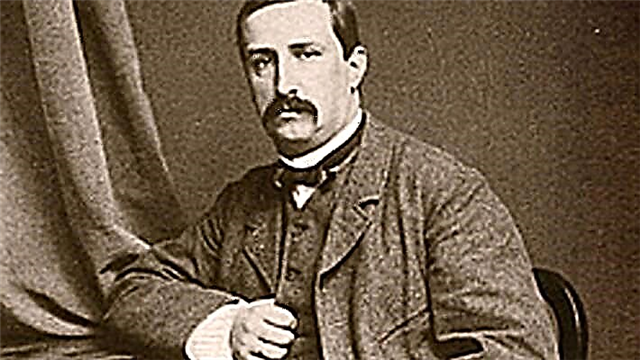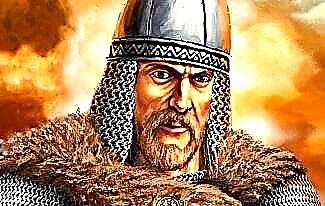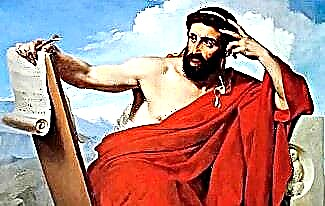The name of Gaius Julius Caesar (100 - 42 AD) is perhaps the first with which the vast majority of people associate the concept of "Ancient Rome". This man made an invaluable contribution to the foundations on which the great Roman Empire was built. Before Caesar, Rome was for many years a relatively small state ruled by a handful of wealthy people. The people were left to themselves, they remembered about them only during the wars. Various laws, contradicting each other, helped to resolve all issues in favor of a thicker wallet or an influential family. Even for the murder of a person, senators only paid a fine.
Caesar significantly expanded the boundaries of the Roman state, turning it from a typical polis into a huge country with territories in Europe, Asia and Africa. He was a talented commander whom the soldiers believed. But he was also a skilled politician. Having captured a city in Greece, which did not accept the ultimatum to surrender, Caesar gave it to the soldiers to plunder. But the next city surrendered and remained completely untouched. It is clear that a good example has been shown to the rest of the cities.
Caesar understood the dangers of oligarchic rule very well. After gaining power, he sought to limit the power of the Senate and the top of the rich. Of course, this was not done because of worries about the common people - Caesar believed that the state should be stronger than any of the citizens or their association. For this he, by and large, was killed. The dictator died at the age of 58 - a respectable age for those times, but by no means the limit. Caesar did not live to see the empire proclaimed, but his contribution to its creation is immeasurable.

1. Caesar was a tall man of average build. He was very careful about his appearance. He shaved and plucked his body hair, but he did not like the bald spot that appeared early on his head, so he was happy to put on a laurel wreath at any occasion. Caesar was well educated, had a good pen. He knew how to do several things at the same time, and he did them well.
2. The exact date of birth of Caesar is unknown. This is a fairly common occurrence for historical characters who have risen from rags to riches. Caesar, of course, began his journey not entirely out of mud, but his family, despite the nobility, was rather poor. Julia (this is the generic name of the family) lived in a very poor area, inhabited mainly by foreigners. Gaius Julius was born in 102, 101 or 100 BC. It happened on July 12 or 13. Sources found out this date indirectly, comparing well-known events from the history of Ancient Rome with the service record of Caesar himself.
3. Guy's father held fairly high government positions, but his dream - to become a consul - never came true. Father died when Caesar was 15 years old. He remained the oldest man in the family.
4. A year later, Gaius Julius was elected priest of Jupiter - a position that confirmed the high origin of the chosen one. For the sake of election, the young man broke off his engagement with his beloved Kossutia and married the consul's daughter. The step turned out to be rash - the father-in-law was quickly overthrown, and repressions began against his supporters and protégés. Guy refused to divorce, was deprived of his position and inheritance - both his and his wife. Even after that, the danger to life remained. Guy had to flee, but he was quickly seized and released only for a large ransom and at the request of the vestals - the virgin priestesses had a formal right to pardon. Having seized power, Sulla, releasing Caesar, muttered, a hundred intercessors will still find out for whom they asked.
5. "Military service" (in Rome, military service was not compulsory, but without it one could not even dream of a more or less serious career) Gaius Julius passed in Asia. There he distinguished himself not only for bravery during the storming of the city of Mytilene and battles with pirates. He became the lover of the king Nicomedes. For all the ancient Roman tolerance, ancient authors call this connection an indelible stain on Caesar's reputation.
6. Around 75 BC. Caesar was captured by the pirates and, according to him, was released, having paid 50 talents for freedom, while the sea robbers demanded only 20. The amount allegedly paid by Caesar is 300,000 denarii. A few years earlier, the young man had barely collected 12,000 denarii to buy off Sulla. Of course, having paid the ransom (it was collected from the coastal cities, willingly providing a gigantic sum to an unknown young Roman), Caesar overtook the pirates and destroyed them to the last man. In our cynical age, the thought immediately comes to mind that the pirates were needed by Guy Julius in order to collect money from cities, and then they were eliminated as unwanted witnesses. The money, of course, remained with Caesar.
7. Until 68, Caesar showed himself nothing but huge debts. He bought up works of art, built villas, and then demolished them, losing interest, fed a huge army of clients - aristocratic recklessness in all its glory. At one point, he owed 1,300 talents.
8. In 68, Caesar became widely known among the plebeians (common people) of Rome thanks to two heartfelt speeches delivered at the funeral of Julia's aunt and wife Claudia. The latter was not accepted, but the speech was beautiful and received approval (in Rome, this kind of speech was distributed through a kind of samizdat, rewriting by hand). However, the grief for Claudia did not last long - a year later, Caesar married a relative of the then consul Pompey, whose name was Pompey.

9. In 66, Caesar was elected an aedile. Nowadays, the office of mayor of the city is closest to the aedile, only in Rome there were two of them. On the city budget, he turned around with might and main. Generous bread distributions, 320 pairs of gladiators in silver armor, decoration of the Capitol and the forum, organization of games in memory of the late father - the plebs were pleased. Moreover, Gaius's colleague Yulia was Bibulus, who was not inclined to protrude his role.
10. Gradually walking up the steps of administrative positions, Caesar increased his influence. He took risks, and several times miscalculated in political sympathies. However, he gradually reached such weight that the Senate, in order to deprive him of popular support, authorized an increase in grain distributions in the amount of 7.5 million denarii. The influence of a man whose life was worth 12,000 10 years ago is now worth millions.
11. The expression "Caesar's wife must be above suspicion" appeared long before the power of Gaius Julius became unlimited. In 62, the quaestor (treasurer) Clodius changed into women's clothes in order to spend a few pleasant hours at Caesar's house with his wife. The scandal, as often happened in Rome, quickly became political. The high-profile case ended in zilch primarily due to the fact that Caesar, who acted as the offended husband, showed complete indifference to the process. Clodius was acquitted. And Caesar divorced Pompey.
12. “I would rather be the first in this village than the second in Rome,” Caesar allegedly said in an impoverished alpine village while traveling to Spain, where he got his rule after the traditional drawing of lots. It is quite possible that in Rome he did not want to remain either the second or even the thousandth - the debts of Gaius Julius by the time of his departure reached 5,200 talents.
13. A year later he returned from the Iberian Peninsula a rich man. It was rumored that he not only defeated the remnants of the barbarian tribes, but also plundered the Spanish cities loyal to Rome, but the matter did not go beyond words.
14. The return of Caesar from Spain was a historic event. He was to enter the city in triumph - a solemn procession in honor of the winner. However, at the same time, consul elections were to be held in Rome. Caesar, who wanted to receive the highest elective post, asked that he be allowed to be present in Rome and take part in the elections (the triumphant had to be outside the city before the triumph). The Senate rejected his request, and then Caesar refused the triumph. Such a loud step, of course, ensured his victory in the elections.
15. Caesar became consul on August 1, 59. He immediately pushed two agrarian laws through the Senate, sharply increasing the number of his supporters among veterans and the poor. Laws were adopted in the spirit of some modern parliaments - with fights, stabbing, threats of arrest of oppositionists, etc. The material aspect was also not missed - for 6,000 talents, Caesar forced the senators to pass a resolution declaring the Egyptian king Ptolemy Auletes “a friend of the Roman people”.
16. The first major independent military campaign of Caesar was the campaign against the Helvetians (58). This Gallic tribe, who lived in the area of modern Switzerland, tired of fighting with neighbors and tried to move to Gaul in the territory of present-day France. Part of Gaul was a province of Rome, and the Romans did not smile at the proximity of a warlike people who could not get along with their neighbors. During the campaign, Caesar, although he made several blunders, showed himself to be a skillful and courageous leader. Before the decisive battle, he dismounted, showing that he would share any fate of the foot soldiers. The Helvetians were defeated, and Caesar received an excellent foothold for the conquest of all of Gaul. Building on his success, he defeated the powerful Germanic tribe led by Ariovistus. The victories brought Caesar great authority among the soldiers.
17. Over the next two years, Caesar completed the conquest of Gaul, although later he still had to suppress a very powerful uprising led by Vercingetorig. At the same time, the commander discouraged the Germans from entering the territory of the Roman provinces. In general, historians believe that the conquest of Gaul had the same impact on the economy of Rome that the discovery of America would later have on Europe.
18. In 55, he embarked on the first campaign against Britain. In general, it turned out to be unsuccessful, except that the Romans made a reconnaissance of the area and learned that the islanders are as unyielding as their continental relatives. The second landing on the islands ended in failure. Although this time Caesar managed to collect tribute from the local tribes, it was not possible to defend the occupied territories and annex them to Rome.
19. The famous Rubicon River was the border between Cisalpine Gaul, considered an outer province, and the Roman state proper. Having crossed it on January 10, 49 with the words “The die is cast” during his return to Rome, Caesar de jure began a civil war. De facto, it was earlier started by the Senate, which did not like Caesar's popularity. Senators not only blocked his possible election to consuls, but also threatened Caesar with a trial for various misdeeds. Most likely, Gaius Julius simply did not have a choice - either he takes power by force, or he will be seized and executed.

20. During the two-year civil war, which took place mainly in Spain and Greece, Caesar managed to defeat the army of Pompey and become the winner. Pompey was eventually killed in Egypt. When Caesar arrived in Alexandria, the Egyptians presented him with the head of the enemy, but the gift did not cause the expected joy - Caesar was sober about the victory over his own tribesmen and fellow citizens.
21. The visit to Egypt brought Caesar not only grief. He met Cleopatra. Having defeated Tsar Ptolemy, Caesar elevated Cleopatra to the Egyptian throne and for two months traveled around the country and, as historians write, “indulged in other pleasures”.
22. Caesar was given the powers of dictator four times. The first time for 11 days, the second time for a year, the third time for 10 years, and the last time for life.
23. In August 46, Caesar made a grand triumph, dedicated to four victories at once. The procession demonstrated not only the crowned captives and hostages from the conquered countries, starting with Vercingetorig (by the way, after 6 years in prison, he was executed after his triumph). The slaves carried treasures valued at approximately 64,000 talents. The Romans were treated to 22,000 tables. All citizens received 400 sesterces, 10 sacks of grain and 6 liters of oil. Ordinary soldiers were rewarded with 5,000 drachmas, for commanders the amount was doubled with each rank.
24. In 44, Caesar included the word imperator in his name, but this does not mean that Rome turned into an empire, and Gaius Julius himself - into an emperor. This word was used in the republic in the meaning of "commander-in-chief" only during the wars. The inclusion of the same word in the name meant that Caesar is the commander-in-chief in peacetime.
25. After becoming a dictator, Caesar carried out numerous reforms. He distributed land to war veterans, conducted a population census, and reduced the number of people receiving free bread. Doctors and people of the liberal professions were granted Roman citizenship, and Romans of working age were prohibited from spending more than three years abroad. The exit for senators' children was completely closed. A special law against luxury was passed. The procedure for the election of judges and officials has been seriously changed.
26. One of the cornerstones of the future Roman Empire was Caesar's decision to grant Roman citizenship to the inhabitants of the annexed provinces. Subsequently, this played a large role in the unity of the empire - citizenship gave great privileges, and the peoples were not too opposed to the transition to the hand of the empire.
27. Caesar was seriously concerned with the problems of finance. During the Civil War, many Romans fell into debt bondage, and valuables, land and homes fell sharply in value. Lenders demanded repayment of debts in cash, and borrowers demanded full cassation of obligations. Caesar acted fairly fairly - he ordered the property to be appraised at pre-war prices. In Rome, gold coins began to be minted on an ongoing basis. For the first time, a portrait of a still living person appeared on them - Caesar himself.
28. The policy of Guy Julius Caesar in relation to former enemies was characterized by humanity and mercy. After becoming a dictator, he abolished many of the old proscriptions, forgave all supporters of Pompey and allowed them to hold public office. Among the forgiven was a certain Mark Julius Brutus.
29. Such a large-scale amnesty was Caesar's fatal mistake. Rather, there were two such mistakes. The first - chronologically - was the adoption of sole power. It turned out that the emerging critical oppositionists had no legal methods of influencing the authorities. In the end, this quickly led to a tragic denouement.
30. Caesar was killed on March 15, 44, during a Senate meeting. Brutus and 12 other senators inflicted 23 stab wounds on him. By will, each Roman received 300 sesterces from Caesar's estate. Most of the property was bequeathed to the nephew of Gaius Julius Gaius Octavian, who later founded the Roman Empire as Octavian Augustus.









